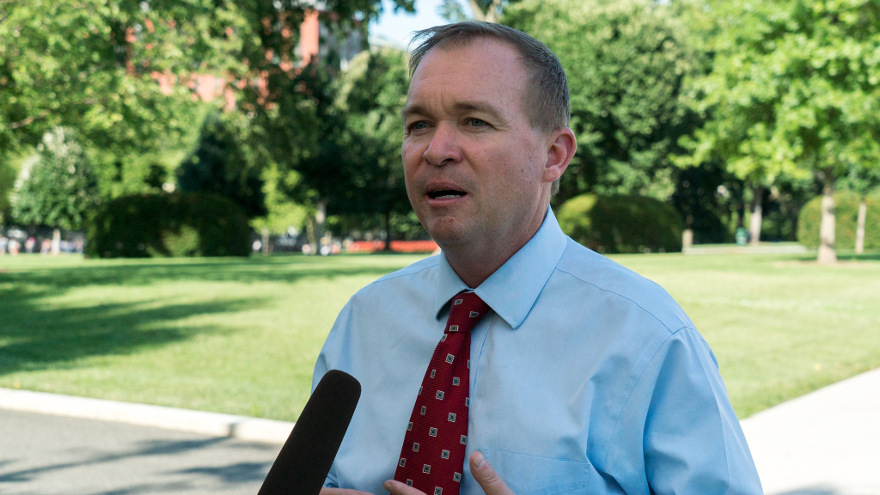Four of the industry associations with significant presence on Capitol Hill celebrated on Wednesday after the U.S. Senate passed a Congressional Review Act Resolution (S.J. Res. 57) to repeal the 2013 Auto Finance Bulletin issued by the Consumer Financial Protection Bureau.
To recap, industry representatives maintained that the CFPB’s 2013 Bulletin on indirect auto financing and fair lending guidance was issued “without any public comment, consultation with other regulatory agencies or transparency." They added the 2013 bulletin created an “environment of uncertainty, where greater clarity is needed, and should have been provided as a formal notice and comment rulemaking, with appropriate input from all stakeholders.”
On Wednesday, the Senate approved S.J. Res 57 by a 51-47 vote. The vote on the resolution, under the Congressional Review Act (CRA), disapproves of the guidance.
“The vehicle finance market in the United States is a highly-competitive market, which benefits consumers as dealers and lenders discount pricing and loan rates to sell and finance new and used vehicles,” said Chris Stinebert, president and chief executive officer of the American Financial Services Association, a trade association representing vehicle finance companies. “The vote today is in the best interests of the car-buying public.”
The House of Representatives is expected to vote on its version of the bill soon, according to industry representatives.
“CBA member banks are strongly committed to ensuring fair lending policies and practices while fulfilling consumers’ financial needs. For that reason, it is critical to have clear rules and guidance from regulators so our member banks can be certain of compliance. The CFPB’s 2013 Auto Bulletin was a backdoor attempt at rulemaking without notice or comment and lacked the clarity needed by lenders,” Consumer Bankers Association President and CEO Richard Hunt said.
“We thank Senators Jerry Moran (R-Kan.) and Pat Toomey (R-Penn.) for leading the effort in the Senate and Majority Leader Mitch McConnell for bringing the resolution to the Senate floor for a vote,” Hunt continued. “We encourage the House to swiftly pass this resolution as well.”
From the dealer side, the sentiment poured in with similar tones, starting with National Automobile Dealers Association president and CEO Peter Welch.
“S.J.Res. 57 continues the bipartisan effort that began years ago to preserve the ability of local dealerships to offer discounted auto loans to their customers, and Sen. Moran is to be commended for his leadership on this issue,” Welch said.
“S.J.Res. 57 is a narrowly-tailored joint resolution that does not amend or change any fair credit law or regulation or impair their enforcement. The legislation is a measured response to the CFPB’s attempt to regulate the $1.1 trillion auto financing market, avoid congressional scrutiny by issuing ‘guidance,’ and impose a new policy without necessary procedural safeguards,” Welch continued.
“We hope this CRA resolution sees swift action in the House of Representatives, which has already demonstrated strong bipartisan support for repealing the CFPB’s flawed guidance and preserving important auto loan discounts for consumers,” Welch went on to say.
Cody Lusk, who is president and CEO of the American International Automobile Dealers Association, also shared his upbeat reaction.
“The CFPB, established to regulate Wall Street, never should have involved itself in dealership operations,” Lusk said. “Today’s vote is confirmation to dealers everywhere that the agency overreached when issuing its 2013 indirect auto financing guidance. The agency concluded, without accurate supporting data, that dealerships were using race as a determining factor when issuing loans. Today the senate has righted a wrong.”
Not all assessments about Wednesday’s developments were as rosy as what these four associations shared. For example, when asked about the Senate’s attempt to roll back the effort to prevent “discrimination” in auto-finance market, Buckley Sandler partner John Redding recently made these points.
“While the CFPB’s 2013 Bulletin on dealer markup is considered offensive by many in the industry, the Senate bill introduced last month to eliminate it is not going to change much,” Redding said.
“The pursuit to eliminate the bulletin may have more to do with the fact that the ‘industry has found it offensive that (lenders) be responsible at the finance source level for actions that they don’t undertake,” he continued.
“If you get rid of the bulletin,” Redding went on to say, “I’m not sure it changes a whole lot at the bureau except for the ability of industry to point at the bulletin and say, ‘I did everything you told me to do in your rule, and yet you are coming after me for doing exactly that.’”
Even more extreme was the negative reaction from Jerry Robinson, a former worker at Santander Consumer USA and a member of the Committee for Better Banks, which describes itself as a coalition of bank workers, community and consumer advocacy groups and labor organizations coming together to improve conditions in the banking industry.
“I worked in auto lending for almost six years,” Robinson said in a statement sent to SubPrime Auto Finance News. “Most of my customers desperately needed a car to drive to work and support their family, and Santander Consumer was all too willing to capitalize on that desperation — with tricks like impossibly high interest rates and discriminatory loans.
“The Senate’s actions today were a big win for injustice and inequality — and they endanger working communities across the United States,” Robinson added.
In another busy week of activities associated with the Consumer Financial Protection Bureau, the American Financial Services Association joined with the National Automobile Dealers Association and other sister trade associations in supporting S.J. Resolution 57 to disapprove the CFPB’s 2013 auto finance guidance.
On March 22, Sen. Jerry Moran (R-Kan.) introduced S.J. Res. 57. This legislation has been co-sponsored by 20 senators. Then earlier this week, Rep. Lee Zeldin (R-N.Y.) introduced H.J Resolution 132, the House companion to S.J. Res. 57.
AFSA explained these two pieces of legislation are unique Congressional Review Act (CRA) resolutions. As such, these resolutions need only a simple majority to pass and cannot be filibustered in the Senate.
The associations reiterated that the CFPB auto financing policy, issued through guidance, directed fundamental market changes “without a transparent rulemaking process to assess the impact on consumers.
“This guidance was issued without any public comment, consultation with CFPB’s sister agencies or transparency,” AFSA continued in a statement.
“AFSA supports Sen. Moran and Rep. Zeldin for taking the lead on this initiative. A vote in Congress is possible later this month,” the organization went on to say.
NADA explained that it supports S.J. Res. 57/H.J. Res. 132 because the CFPB’s guidance pressured indirect auto finance companies to eliminate consumer discounts on auto credit by dealers.
“This policy, issued without prior notice or public comment, would have raised credit costs for auto buyers,” NADA said.
“Additionally, many members of Congress view the CFPB’s guidance as a roundabout attempt to regulate dealers, despite the dealers’ statutory exemption from the CFPB’s jurisdiction (Sec. 1029(a) of Dodd-Frank).
Enactment of S.J. Res. 57/H.J. Res 132 would deter similar improper regulatory action in the future,” according to NADA, which also told dealers that they are encouraged to contact their senators and representatives to voice their support for this legislation.
Mulvaney on Capitol Hill
Also this week, acting director CFPB director Mick Mulvaney appeared during hearings orchestrated by both the House Committee on Financial Services as well as the Senate Banking Committee.
According to his written testimony to each chamber and shared by the CFPB, Mulvaney gave a compliance update that likely should please auto finance companies and dealerships large and small.
“In another change, the bureau practice of ‘regulation by enforcement’ has ceased,” Mulvaney told lawmakers. “The bureau will continue to enforce the law. That is our job, and we take it seriously. However, people will know what the rules are before the bureau accuses them of breaking those rules.
“Through the changes I have discussed and others, I am making sure the bureau is operating within its statutory mandate, is accountable for its actions, and is doing the American people’s business in ways that are efficient and effective,” he continued.
Coinciding with his visits to Capitol Hill, the bureau issued a request for information (RFI) on its handling of consumer complaints and inquiries. The CFPB is seeking comments and information from interested parties to assist the bureau in assessing its handling of consumer complaints and consumer inquiries and, consistent with law, considering whether changes to its processes would be appropriate.
To date, the bureau said it has received 1.5 million consumer complaints.
This is the 12th in a series of RFIs announced as part of Mulvaney’s call for evidence to ensure the bureau is fulfilling its proper and appropriate functions.
“This RFI will provide an opportunity for the public to submit feedback and suggest ways to improve outcomes for both consumers and covered entities,” the CFPB said.
The series of RFIs coupled with other actions by the bureau under Mulvaney’s leadership frustrated Rep. Maxine Waters (D-Calif.), ranking member of the House Committee on Financial Services.
“Let me say at the outset that Mr. Mulvaney is not the acting director of the Consumer Financial Protection Bureau,” Waters said in her opening statement during this week’s hearing.
“He was illegally appointed by President Trump in a move that blatantly contradicts the Dodd-Frank statute, which is very clear that the deputy director of the agency shall serve as acting director in the case of absence or unavailability of the director,” she continued.
“I want to be very clear that Democrats’ participation in this hearing is not in any way an acknowledgment of Mr. Mulvaney’s legitimacy at the Consumer Bureau. Nonetheless, given the many impactful and indeed harmful decisions Mr. Mulvaney is making with regard to the Consumer Bureau, it is necessary for us to engage with him in an oversight capacity here today while the courts decide who should actually be in charge,” Waters went on to say.
The California lawmaker later added, “And it is very clear that Mr. Mulvaney is indeed carrying out this president’s agenda at the Consumer Bureau. He has taken a series of actions that weaken the agency’s ability to carry out its important mission and benefit the predatory actors that the agency is designed to police.”
Mulvaney’s appearance before the House contingent can be watched here or through the window at the top of this page.
As another state in the Northeast established an consumer protection agency that resembles the one at the federal level, the acting director of the Consumer Financial Protection Bureau included what he called a “request that Congress make four changes to the law to establish meaningful accountability for the bureau.”
Mick Mulvaney made the declaration this week as the CFPB released its semi-annual report highlighting the bureau’s work. This is the first report issued by Mulvaney, and it includes his four recommendations for statutory changes to the bureau.
“The bureau is far too powerful, with precious little oversight of its activities,” Mulvaney said. “The power wielded by the director of the bureau could all too easily be used to harm consumers, destroy businesses or arbitrarily remake American financial markets.
“I’m requesting that Congress make four changes to the law to establish meaningful accountability for the bureau. I look forward to discussing these changes with Congressional members,” he went on to say.
In the report’s introduction letter, Mulvaney recommends four changes to the Dodd-Frank Wall Street Reform and Consumer Protection Act (Dodd-Frank Act).
The first recommendation is to fund the Bureau through Congressional appropriations. The second is to require legislative approval of major rules.
His third recommendation is to ensure that the director answers to the president in the exercise of executive authority. And the fourth is to create an independent inspector general for the bureau.
“I have no doubt that many members of Congress disagree with my actions as the acting director of the bureau, just as many members disagreed with the actions of my predecessor,” Mulvaney said in that opening letter. “Such continued frustration with the bureau’s lack of accountability to any representative branch of government should be a warning sign that a lapse in democratic structure and republican principles has occurred.
“This cycle will repeat ad infinitum unless Congress acts to make it accountable to the American people,” he added.
The complete semi-annual report from the CFPB can be downloaded here.
Initial reaction to Mulvaney moves
As Mulvaney reference about the assessment of bureau performance by lawmakers, observers who closely watch activities on Capitol Hill and beyond offer reaction that demonstrated the polar-opposing views of the potential CFPB changes.
Consumer Bankers Association president and chief executive officer Richard Hunt gave an upbeat assessment of Mulvaney’s recommended statutory changes to the CFPB.
“We appreciate acting CFPB director Mick Mulvaney’s goal of bringing greater accountability to the bureau,” Hunt said
“We look forward to hearing further details from acting director Mulvaney on his policy proposals in his upcoming testimony before Congress, and we strongly believe an independent, bipartisan commission at the CFPB — not subject to the political shifts of changing administrations — is the best way forward to provide for accountability, certainty and stability at the CFPB,” Hunt went on to say.
Meanwhile, consumer advocacy organization Allied Progress sent a press release to SubPrime Auto Finance News in which the subject line blared, “Mulvaney Goes in for the Kill, Asks Congress to Cripple the CFPB.”
Karl Frisch, executive director of Allied Progress, elaborated on the organization’s stance.
“Mick Mulvaney knows the work of the CFPB is extremely popular with consumers. That is why he didn’t propose the outright elimination of the bureau – though that is effectively what he is seeking. The CFPB was designed to be an independent financial watchdog so that politicians in D.C. who take millions from Wall Street special interests can’t easily stop its important work,” Frisch said.
He continued, “Mulvaney wants to put members of Congress in charge of the CFPB’s funding and require congressional approval of its consumer protection rules because he knows it will grind the bureau’s work holding big banks, predatory lenders and other bad financial actors to a halt. Who better to go to bat against the CFPB than a bunch of D.C. politicians on the take from Wall Street special interests.”
“The courts have already ruled that it is perfectly constitutional to prohibit the President from firing the CFPB’s director without cause. Under the law, the President can appoint a new director when the previous director steps down or their five-year term expires. That’s not a good enough for Mulvaney and Wall Street. They won’t stop until the CFPB’s director constantly wonders if defending consumers and holding industry accountable on any given day will cost them their job,” Frisch concluded.
CFPB-like agency now in New Jersey
In related developments, New Jersey joined Pennsylvania in creating a regulator that acts similar to the CFPB, but on a state level.
New Jersey attorney general Gurbir Grewal recently announced that Governor Phil Murphy will nominate Paul Rodriguez to serve as the director of the New Jersey Division of Consumer Affairs, the lead state agency charged with protecting consumers’ rights, regulating the securities industry and overseeing 47 professional boards.
Grewal explained Rodriguez’s selection highlights the administration’s efforts to fill the void left by the Trump Administration’s “pullback” of the CFPB, fulfilling one of Murphy’s promises to create a “state-level CFPB” in New Jersey.
Rodriguez, a New Jersey native, is currently serving as acting counsel to New York City Mayor Bill de Blasio where he provides advice and strategic guidance to the mayor and top administrative officials on legal, management and policy objectives. As a member of Mayor de Blasio’s senior management team, Rodriguez was dedicated to ensuring a fairer and more just city for all.
“As the federal government abandons its responsibility to protect consumers from financial fraudsters, it is more important than ever that New Jersey picks up the mantle to protect its own residents,” Grewal said. “Paul has the energy and ability necessary to lead the Division as we work to protect New Jerseyans from fraud and professional misconduct in the marketplace.”
During his time in city government, Rodriguez managed numerous aspects of de Blasio’s human rights, equity and “good government” reform agendas, including transparency, worker equity and expansions to the Human Rights Law.
Before joining the de Blasio administration, Rodriguez was an associate at Simpson Thacher & Bartlett in New York City where he worked in a variety of areas, including financing transactions, securities regulation, and intellectual property. His pro bono work for the firm included assisting with the negotiation of a multi-million dollar framework agreement on behalf of indigenous tribes in Peru.
Rodriguez also served as the Simpson Thacher & Bartlett extern to Brooklyn Legal Services Corporation A, representing nonprofits dedicated to serving low-income communities. He previously served as a projects specialist and senior staff member for U.S. Senator Frank Lautenberg, specializing in transportation, infrastructure, organized labor, and homeland security.
Rodriguez will begin serving as acting director of the Division of Consumer Affairs on June 1. Murphy will formally nominate Rodriguez to the position, which is subject to the advice and consent of the State Senate.
In the interim, Kevin Jespersen will serve as acting director of the division, a position currently held by Sharon Joyce, who is transitioning to lead the Office of Attorney General’s newly created Office of the New Jersey Coordinator of Addiction Response and Enforcement Strategies (NJ CARES).
“Kevin is a consummate professional and a trusted member of my leadership team. His willingness to step in as acting cirector ensures that the Division of Consumer Affairs will be in capable hands during this time of transition,” Grewal said. “I am grateful for all Sharon has accomplished during her tenure in Newark, both as deputy director of the Division of Law and as acting director of the Division. Now that she is free to dedicate herself fully to her role as director of NJ CARES, I look forward to Sharon’s continued successes as she leads New Jersey’s fight to end the deadly scourge of addiction.”
All of the developments in New Jersey arrived less than a year after Pennsylvania’s attorney general took similar steps in creating an agency like the CFPB.
Industry associations and private and publicly traded companies aren’t the only entities replying to a request for information issued by the Consumer Financial Protection Bureau.
Last week, the Federal Trade Commission’s Bureau of Consumer Protection (BCP) filed a comment to the CFPB in response to that agency’s request for information to help it assess the process it uses to issue civil investigative demands (CIDs).
The FTC acknowledged CIDs are a key tool in investigating potential law violations and bringing enforcement actions to stop illegal conduct and provide relief to consumers. A CID from either the FTC or the CFPB may seek written answers to interrogatories, documents, tangible things, oral testimony, or some combination of all of these.
In particular, the CFPB sought input "on how best to achieve meaningful burden reduction or other improvements," while continuing to achieve its statutory and regulatory objectives. The FTC’s comment describes its experience with CIDs, including recent reforms.
“We applaud the Bureau of Consumer Financial Protection for undertaking a critical assessment of its investigative processes,” said Thomas Pahl, acting director for BCP. “We hope our comment describing BCP’s experience with CIDs, including recent reforms, is valuable to the bureau in making its investigative processes efficient and effective.
“We look forward to a continued partnership with the Bureau on this and other issues in pursuing the agencies’ shared goal of protecting American consumers,” Pahl continued.
In response to the request for comment, the FTC’s Bureau of Consumer Protection explained its procedures for issuing consumer protection CIDs, provided feedback on Bureau of Consumer Financial Protection processes in response to specific requests for information, and outlined generally reforms that the FTC’s Bureau of Consumer Protection implemented in July 2017 related to consumer protection CIDs.
Those measures include:
—Adding more detail about the scope and purpose of investigations to give companies a better understanding of the information sought
—Limiting the relevant time periods to minimize undue burden on companies and focus the commission’s finite resources on investigating harms that have an immediate impact on consumers
—Shortening and simplifying the instructions for providing electronically stored data
—Increasing response times for CIDs, where appropriate
The commission vote approving the comment was 2-0.
As the Consumer Financial Protection Bureau issued another issued a request for information (RFI) — this time about its adopted regulations and new rulemaking authorities — associations strongly endorsed legislation introduced in the House of Representatives this week that would establish a Senate-confirmed, bipartisan commission at the CFPB.
A five-member body that would oversee the bureau is the foundation of H.R. 5266, which was introduced by Rep. Dennis Ross, a Florida Republican and Rep. Kyrsten Sinema, an Arizona Democrat.
During negotiations on the Dodd-Frank Act, the Consumer Bankers Association (CBA) recollected that then-House Financial Services Committee chairman Barney Frank (D-Mass.) originally drafted legislation, which Democrats supported, creating the CFPB as a bipartisan board.
Now more than five years later, H.R. 5266 is working its way through Capitol Hill as a measure also and cosponsored by Rep. David Scott (D-Ga.) and Ann Wagner (R-Mo.).
“It is beyond comprehension to give a single director nearly unilateral authority over every consumer and financial institution in the country. We applaud this bipartisan solution establishing a Senate-confirmed, bipartisan commission — like nearly all other regulatory agencies in the country — to bring greater stability and balance to the CFPB,” CBA president and chief executive officer Richard Hunt said.
“A commission prevents the regulatory pendulum from swinging wildly back-and-forth every time a new person sits in the Oval Office and will help ensure the CFPB fulfills its mission of consumer protection,” Hunt continued.
“We thank representatives Ross, Sinema, Scott and Wagner for their leadership on this important issue and acting CFPB director Mulvaney for bringing the CFPB back in line with its Congressional mandate,” Hunt went on to say.
Along with Hunt, the president and CEO of the National Association of Federally-Insured Credit Unions (NAFCU) applauded the action.
“NAFCU has long advocated for a commission structure at the CFPB to provide long term continuity and stability,” Dan Berger said. “A commission allows for input from differing views to form strong public policy. Until that point, we appreciate working with acting director (Mick) Mulvaney and note his continued support of the credit union industry.”
As lawmakers debate how the agency should operate, the CFPB is continuing on with its business with its latest RFI.
The bureau is seeking comments and information from interested parties to assist the Bureau in considering whether it should amend any rules it has issued since its creation or issue rules under new rulemaking authority provided for by the Dodd-Frank Act. This is the eighth in a series of RFIs announced as part of Mulvaney’s call for evidence to ensure the bureau is fulfilling its proper and appropriate functions to best protect consumers.
“This RFI will provide an opportunity for the public to submit feedback and suggest ways to improve outcomes for both consumers and covered entities. The next RFI in the series will address the bureau’s inherited regulations and inherited rulemaking authorities, and will be issued next week,” the agency said.
The RFI on adopted rules is available here.
The CFPB will begin accepting comments once the RFI is printed in the Federal Register, which is expected to occur on approximately March 19. The RFI will be open for comment for 90 days.
The bureau anticipates issuing RFIs on the following topics in the coming weeks:
— Inherited rules
— Guidance and implementation support
— Consumer education
— Consumer inquiries
The American Recovery Association (ARA) landed an enhanced relationship with a finance company on Friday.
ARA announced a new partnership with Bridgecrest Acceptance, a licensed third-party servicer, servicing loans for DriveTime and other affiliated finance companies.
As part of this agreement, ARA will assist Bridgecrest in its vendor vetting, training and monitoring program.
ARA president Dave Kennedy highlighted that the organization seeks to be a viable industry solution to the high cost of vendor training. He sees this partnership is a major benefit to Bridgecrest’s current vendor network, as it significantly reduces the financial burden placed upon them.
“We are honored to be chosen as the exclusive training program by Bridgecrest and are happy to help reduce the cost burden on vendors,” Kennedy said.
“We still believe repossessors should only have to choose one training service, but until our compliance program is accepted by everyone, we are determined to provide the best value,” he went on to say.
For more information about ARA, its partnerships and its member benefits, visit repo.org.
The partnership arrived about a month ahead of ARA’s annual event — the North American Repossessors Summit (NARS) — which is reaching its 10th anniversary.
NARS 2018 will be hosting more than 600 professionals from the collateral recovery and remarketing industries to gather and network. This year’s speaker lineup includes Tom Jones, scientist, author, pilot and veteran NASA astronaut, as well as other industry professionals who will focus on open and collaborative discussions about the future of collateral recovery and remarketing.
NARS now will include a two-hour open forum meeting exclusively for business owners who will be able to participate in crucial discussions of the challenges and complexities repossessors currently face in order to find solutions that help lay the foundation for the future of the industry.
The theme for the 10th annual summit is “Stronger Together: Celebrating 10 years of Leadership, Education and Unity,” with a keynote by astronaut Tom Jones delivering an inspiring story of adventure, teamwork and inspiration to motivate audiences to work hard together to overcome obstacles to their own particular mission.
This year’s schedule also includes other insightful speakers and powerful roundtable discussions, as well as other exciting events such as the sixth annual golf tournament, AT&T Stadium Tour, Harding Brooks Cocktail Party, and the Digital Recognition Network (DRN) closing party and live auction to end the summit.
The summit will be held at the Omni Mandalay Hotel at Las Colinas in Irving, Texas, on April 19-20.
To register, visit reposummit.com.
It’s been a busy start to 2018 at the Consumer Financial Protection Bureau, especially since acting director Mick Mulvaney took office.
First came multiple waves of requests for information about how the bureau is performing. Then on Monday, the CFPB highlighted three primary goals within its five-year strategic plan.
Along with other objectives, the bureau plan outlined those three primary goals as:
—Ensure that all consumers have access to markets for consumer financial products and services.
—Implement and enforce the law consistently to ensure that markets for consumer financial products and services are fair, transparent and competitive.
—Foster operational excellence through efficient and effective processes, governance and security of resources and information.
“If there is one way to summarize the strategic changes occurring at the Bureau, it is this: we have committed to fulfill the bureau’s statutory responsibilities, but go no further,” Mulvaney said in a news released shared by the bureau.
“By hewing to the statute, this strategic plan provides the bureau a ready roadmap, a touchstone with a fixed meaning that should serve as a bulwark against the misuse of our unparalleled powers,” he continued.
Mulvaney explained the plan draws directly from the Dodd-Frank Wall Street Reform and Consumer Protection Act and refocuses the bureau’s mission on regulating consumer financial products or services under existing federal consumer financial laws, enforcing those laws judiciously, and educating and empowering consumers to make better informed financial decisions.
Among changes from the prior strategic plan, the bureau said it will now focus on equally protecting the legal rights of all, including those regulated by the bureau, and will engage in rulemaking where appropriate to address unwarranted regulatory burdens and to implement federal consumer financial law and will operate more efficiently, effectively, and transparently.
“Armed with this strategic direction, I look forward to working with the talented and hardworking people at the bureau to fulfill the bureau’s statutory mission in service of the American people,” Mulvaney wrote in the opening letter of the 16-page plan that’s available online here.
With regulators such as the Consumer Financial Protection Bureau issuing official requests for information about the implications of rules, investigations and enforcement actions, a sterling example might have arrived from BB&T Dealer Financial Services.
In a direct message to SubPrime Auto Finance News on Friday, the auto finance division of the North Carolina-based commercial bank indicated that it’s abandoning its flat-fee dealer compensation program first implemented nearly three years ago.
Brian Davis, BB&T’s director of corporate communications, explained the reasons for the bank’s decision; details that likely won’t come as much of a surprise to providers trying to compete for the best paper to fill their portfolios.
“While we had some successes with the flat fee program announced in 2015, BB&T also experienced an overall reduction in volume,” Davis said. “So to provide our dealer clients with more options and better flexibility, we will introduce a more traditional auto pricing program in mid-March.”
“BB&T remains firmly committed to the auto finance industry and to the fair and equal treatment of all consumers,” Davis added.
The bank originally made the switch to flat fees back in July 2015, just weeks after the CFPB published a rule that allowed the agency to supervise larger nonbank auto finance companies for the first time. The bureau already supervised auto financing at the largest banks and credit unions, but that rule extended that supervision to any nonbank auto finance company that makes, acquires or refinances 10,000 or more contracts or leases in a year.
When then-CFPB director Richard Cordray arrived for his semiannual hearing with the House Financial Services Committee that fall, lawmakers clashed with the agency leader over the rule, believing it was directly targeting dealer participation in hopes of moving the entire industry toward a flat-fee structure.
Rep. Scott Garrett, a New Jersey lawmaker, directly asked Cordray, “Are you working to eliminate dealer reserves?”
Cordray replied with, “We have been working to try to address a practice that we believe is discriminatory, discretionary markups.”
With dealer participation possibly coming back at BB&T Dealer Financial Services, perhaps the bank’s auto finance activities will improve.
According to the bank’s third quarter financial statement — the last one that included a carve-out of Dealer Financial Services performance as the institution changed its structure and reporting for Q4 — net income for its auto-finance division came in at $38 million, flat compared to the prior quarter and down by $2 million year-over-year.
Along with naming a chief of staff who formerly served the chair of the House Financial Services Committee, Consumer Financial Protection Bureau acting director Mick Mulvaney is continuing to put his stamp on how the regulator operates.
The CFPB issued another request for information (RFI); this time in connection with the bureau’s enforcement processes. The agency indicated it is seeking information to help assess the overall efficiency and effectiveness of its processes related to the enforcement of federal consumer financial law.
This is the third in a series of RFIs announced as part of Mulvaney’s call for evidence to ensure the bureau is fulfilling its proper and appropriate functions to best protect consumers.
“This RFI will provide an opportunity for the public to submit feedback and suggest ways to improve outcomes for both consumers and covered entities,” the bureau said in a news release.
“The next RFI in the series will address the bureau’s supervisory processes, and will be issued next week,” the CFPB added.
Previously, the bureau announced that it was seeking feedback in connection with civil investigative demands (CIDs).
Meanwhile earlier this week, Mulvaney named Kirsten Sutton Mork chief of staff for the agency. Sutton Mork had been serving as staff director of the House Financial Services Committee under Chairman Jeb Hensarling.
“I am pleased to announce Ms. Sutton Mork as the new chief of staff at the Bureau of Consumer Financial Protection,” Mick Mulvaney said. “I worked with Kirsten during my tenure as a member on the House Financial Services Committee and can attest to her in-depth financial policy expertise, proven track record of developing and implementing strategic initiatives, and ability to manage a team.
“Kirsten brings with her more than a decade of invaluable experience that will advance the mission of the bureau and make it more efficient, effective and accountable,” Mulvaney added.
Sutton Mork’s tenure on Capitol Hill spans the financial crisis and post-crisis legislative response. She staffed Hensarling during House Financial Services Committee, House and conference committee consideration of the legislation that established the bureau, the Dodd-Frank Act.
The CFPB insisted Sutton Mork is intimately familiar with the bureau’s statutory mission and obligations. She was appointed deputy staff director to the House Financial Services Committee in 2013 and became staff director in early 2017.
Another busy week at the Consumer Financial Protection Bureau closed with a personnel move by the acting director that one legal expert called without hesitation, “a big deal.”
According to an internal email first brought to light by The Washington Post and later obtained by SubPrime Auto Finance News, CFPB acting director Mick Mulvaney indicated the office of fair lending and equal opportunity will be transferred to the director’s office as part of the office of equal opportunity and fairness.
Why is that such a crucial move? The office of fair lending and equal opportunity has been involved in some of the stiffest enforcement actions within the auto finance space orchestrated by the bureau. Here’s a brief rundown of three examples, stretching up and down the market:
—In late 2013, the CFPB reached a settlement with Ally Financial, a package of enforcement actions that included $98 million in penalties and instruction on how the company should revamp its compliance department to prevent future alleged discriminatory activities.
—In September 2015, as part of its $18 million penalty in the auto space, the CFPB and Department of Justice ordered Fifth Third Bank to substantially reduce or eliminate entirely dealer discretion. Officials told the bank to pay that $18 million to “harmed” African-American and Hispanic borrowers. Meanwhile the dealer participation stipulations were included in the agreement.
—In January 2016, the bureau took enforcement against Herbies Auto Sales, a single buy-here, pay-here dealership in Greeley, Colo., for what the CFPB deemed to be abusive financing schemes, hiding auto finance charges and misleading consumers. The CFPB told Herbies to pay $700,000 in restitution to harmed consumers, with a suspended civil penalty of $100,000.
“The Fair Lending Office will continue to focus on advocacy, coordination and education, while its current supervision and enforcement functions will remain in (the supervision, enforcement & fair lending division). I do not expect that staff will experience changes in employment status, but it is possible that some may experience changes in jobs and duties,” Mulvaney wrote.
At the beginning of the message, Mulvaney said, “As I mentioned last week, I am continuing to evaluate Bureau operations, and will be making changes where I deem necessary. These changes are intended to help make the Bureau more efficient, effective, and accountable, and I plan to seek both internal and external input as I continue to evaluate how we work.”
Mulvaney also mentioned in the email that the bureau’s office of consumer response will be relocated within the consumer education and engagement division.
“We do not anticipate that this move will result in any changes to internal operations and functions, or to any individual’s employment status,” he wrote.
The personnel actions at the CFPB coincided with the D.C. Circuit Court of Appeals ruling that the agency is constitutional.
Along with the Mulvaney email, the CFPB also provided SubPrime Auto Finance News with comments from John Czwartacki, who is senior adviser to the acting director.
“The bureau’s statutory mandate includes the supervision and enforcement of fair lending laws and regulations, and the bureau will continue to perform those functions. The fact is, it never made sense to have two separate and duplicative supervision and enforcement functions within the same agency — one for all cases except fair lending, and the other only for fair lending cases,” Czwartacki said.
“By announcing our intent to combine these efforts under one roof, we gain efficiency and consistency without sacrificing effectiveness. And by elevating the office of fair lending to the director’s office, we have enhanced its ability to focus on its other important responsibilities,” he went on to say.
Assessing these moves
SubPrime Auto Finance News gathered reaction from a trio of leading experts. Each one expressed the impact of these moves.
“This is a big deal,” Mayer Brown consumer financial services partner and former CFPB official Ori Lev said.
“Moving the office of fair lending out of the division that handles enforcement and supervision is more than a message. It will have real life impact on the number of CFPB fair lending cases and examinations,” Lev continued.
Terry O’Loughlin is the director of compliance at Reynolds Document Solutions, a part of Reynolds and Reynolds. O’Loughlin offered this reply after reviewing Mulvaney’s message.
“As to Mulvaney, I think that he represents the better view of a regulatory agency,” he said. “Regulation by enforcement is unfair to those industries, which are the targets of the enforcement and regulation.
“It forces a heightened regulatory environment where resources are being spent needlessly. If matters need regulation then the regulator should announce those regulations after observing the appropriate administrative procedures,” O’Loughlin went on to say.
The team at Hudson Cook is taking an even deeper look at all of the changes at the CFPB since Richard Cordray departed as director last November. Hudson Cook is offering a free webinar beginning at 2 p.m. EST on Wednesday as the firm quipped, “Intrigue? Drama? Suspense? You don’t need Hollywood (or Ben Affleck), as life imitates art at the CFPB.”
Partner Allen Denson is set to be joined by Hudson Cook colleagues Lucy Morris, Jean Noonan and Jim Chareq where these personnel moves will be among the more than half dozen topics included in the webinar agenda.
“This effort to reorganize the bureau’s fair lending responsibilities is just the latest in a series of initiatives by acting director Mulvaney to repurpose the bureau’s oversight of financial markets,” Denson said.
“It signals a further retreat from some of the more controversial positions held by the bureau under director Cordray,” Denson added.












